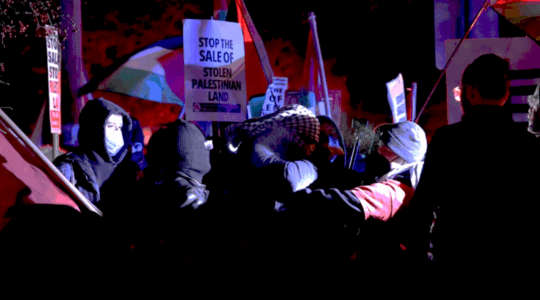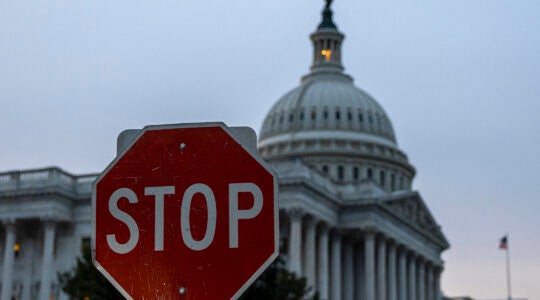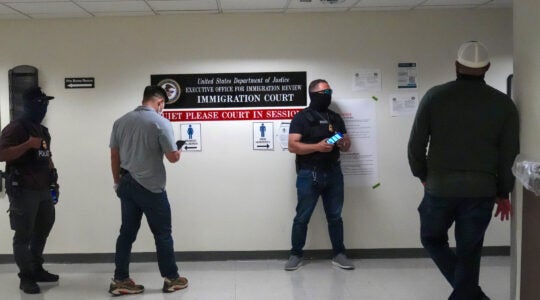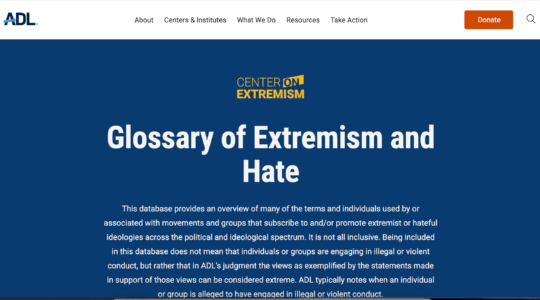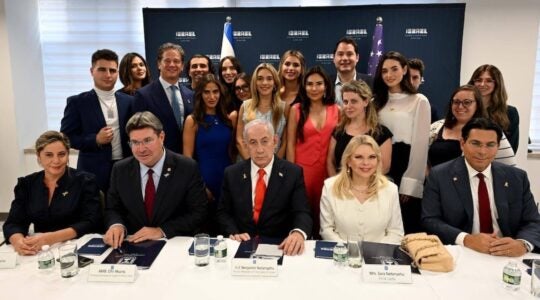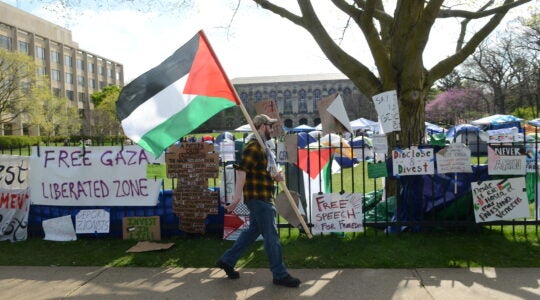This article was produced as part of JTA’s Teen Journalism Fellowship, a program that works with Jewish teens around the world to report on issues that affect their lives.
Support for Israel. Hope for a new Iran. Confusion about their complicated Jewish identities.
These are just a few of the emotions Iranian-Jewish American teens experienced over the past two weeks, after Israel launched attacks on Iranian nuclear and military facilities and Iran retaliated, beginning an ongoing war. The United States has since brokered a ceasefire, but not before striking three Iranian nuclear sites on Saturday.
Iranian-Jewish American teens inhabit a unique identity at the crossroads of all three countries involved in the war. Many of them are residents of Los Angeles, home to the largest Iranian community outside of Iran. Often, they are also the first in their families to have been born in the United States, the children of Iranian Jews who fled the country due to the religious persecution under Iran’s government after the Islamic Revolution of 1979.
For Ezri Ellman, 18, this regime has complicated his relationship with Iran.
“I do enjoy a lot of Iranian traditions and customs that my family practices,” said Ellman, “but I do not agree with or identify with the current government in Iran.”
Ellman’s maternal grandfather immigrated from Iran to the United States before the revolution. Growing up in Los Angeles, he has immersed himself in Jewish community at Camp Ramah, where he now works as a counselor, as well as at Temple Israel of Hollywood, a Reform synagogue where his mother is a rabbi. At home, his family often makes gondi (Iranian Jewish meatballs).
Ellman described Israel as being the subject of “generational differences” between him and his mother.
“My mom is a very staunch Zionist,” Ellman said. “My mom will stand by Israel almost no matter what, and I feel like she supported that decision [of Israel to bomb Iran]. I feel like these adults in my life are more connected to Israel than us because when they were growing up, this was something that was more prevalent in their life. Their parents are the Holocaust survivors, and they just have a stronger connection to Judaism, and therefore Israel, I think.”
In contrast, Ellman described himself as being critical of Israel’s government even before Israel’s attacks on Iran — but even more so amid the new conflict.
“It made me more critical of the Israeli government after what unfolded where Israel attacked [Iran’s] nuclear weapons because I feel like that is moving the world closer to war,” Ellman said. “It was obviously a big decision with huge repercussions for civilians in Israel. Tel Aviv was hit directly, [as were] many other cities.”
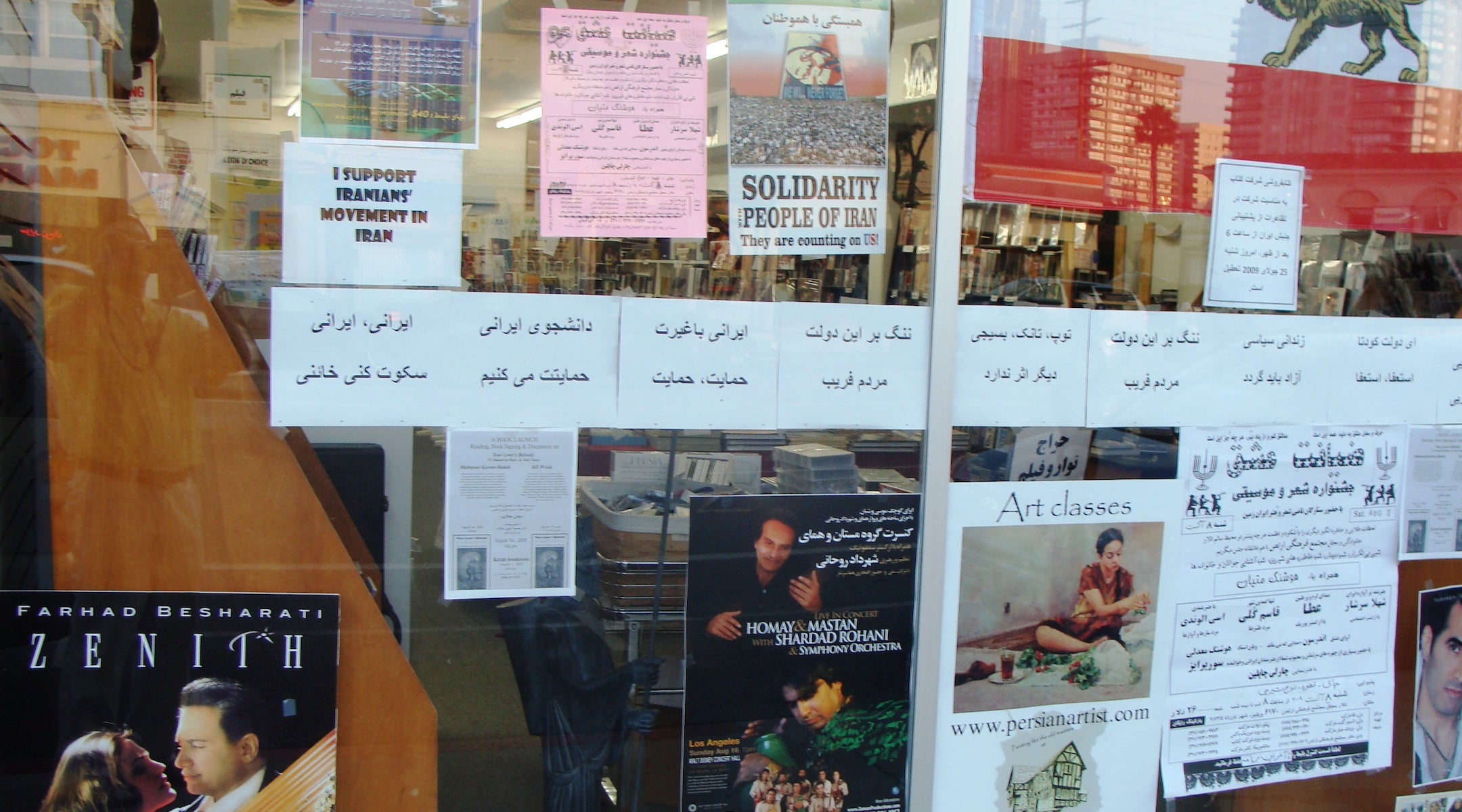
A storefront on Westwood Boulevard, in the heart of the Los Angeles Iranian-American community, displays signs in support of reform movements in Iran. (Wikimedia Commons)
Ethan Gabayan, 18, has grown up in Los Angeles with two parents who immigrated from Iran to the United States during the revolution because of religious persecution. He has grown up immersed in Iranian culture, learning how to speak Farsi and listening to Persian radio with his parents at home.
“It’s definitely been difficult to try and balance both [cultures],” Gabayan said, “but at the same time, it’s been very welcoming because I’ve been going to Jewish day school my entire life, from ‘mommy and me’ to twelfth grade where I just graduated. I’ve been surrounded by a lot of other Persian Jews, so in that sense the community is very strong for me.”
For Gabayan, who is a Conservative Jew, the Iran-Israel War has only strengthened his support of Israel.
“The missile strikes that Iran is sending to Israel furthers my ideology on the fact that [Iran is] no longer just acting in proxy wars — they’re full on just attacking [Israel] themselves,” said Gabayan. “So I feel like that’s really been pushing my point and furthering my idea that the regime in Iran needs to change.”
His hope for regime change aligns with his parents’ beliefs.
“They’re supporting Israel because they want their regime to change, and they want to go back to the country that they knew when they were younger,” Gabayan said.
Despite his staunch support for Israel, however, Gabayan said that the new conflict has made him feel, at times, unwelcome in certain Jewish settings due to his Iranian heritage. Recently, he was playing basketball with a Jewish teen and, after speaking to his brother in Farsi, the other teen asked what language they were speaking.
“I was kind of hesitant to say ‘Farsi’ with the whole thing that’s going on now,” Gabayan said. “I was also wearing a Star of David necklace, so for both those things to collide — I didn’t understand what the person’s response might have been.”
Noah Khorrami, 18, has also grown up in Los Angeles with parents who both immigrated from Iran. He feels at home in Los Angeles’ Iranian Jewish community, which he described as “tight-knit” and “synchronous.” A Reform Jew, he has attended Jewish day school while speaking Farsi with his parents at home, describing his house as full of Persian decorations.
Alienated by Iran’s government, Khorrami supports Israel, where he feels welcomed.
“I love Israel. I’ve been there several times,” said Khorrami. “I know in Iran it’s not free; in Israel, it’s very free and a democratic state.” He added that he has inherited this view from his parents.
Khorrami had anticipated the conflict and believed it to be long overdue.
“I feel like the current events are like the results of waiting for a bomb to go off. The fuse has been lit for a very long time, and I feel like this was expected. The fact that Israel had not attacked Iran, which has supplied resources to many proxies that have been fighting Israel for a very long time — I think it’s just surprising [Israel] hasn’t attacked all this time.”
He welcomed Israel’s decision to confront Iran directly.
“I’m glad [Israel] took the offensive,” Khorrami said. “Israel is not standing for the corruption and tyranny that [Iran’s] government has over its people.”
Khorrami’s strong support of Israel hasn’t negated his love for both sides of his culture.
“I’m still proud of both my Iranian and Jewish heritage and just hope for a definite end to the chaos that is constantly ensuing,” he said. “But I acknowledge the fact that some things can’t be handled with peace and negotiation.”
Dev Nabizadeh, 16, lives in Piedmont, California, where he has grown up eating dishes like khoresh-e ghormeh sabzi (an herb, bean and lamb stew often called the national dish of Iran), tahdig (crispy rice) and koofteh (meatballs). His father fled from Iran to Israel before settling in the United States.
Lacking the intertwined Iranian Jewish community of Los Angeles, Nabizadeh described his Iranian and Jewish friends as distinct communities that he engages with separately.
“I feel like you would think that the double identity would take from each of the communities, but it really doesn’t,” said Nabizadeh, who practices Reform Judaism.
Nabizadeh holds a negative view of Iran’s government. “Most of my perspective comes from my father because he lived there,” said Nabizadeh. “He experienced it.”
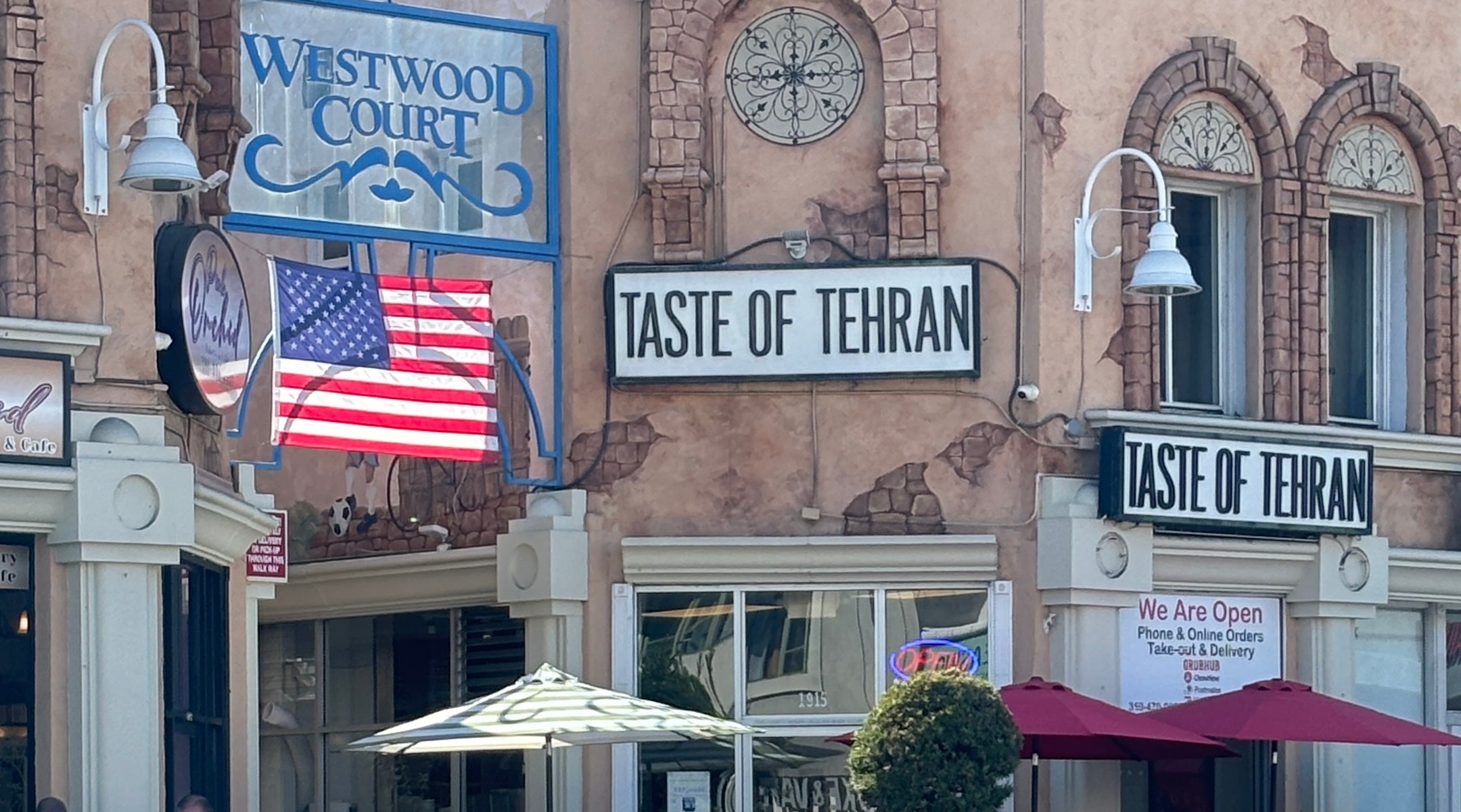
A restaurant in the Los Angeles neighborhood nicknamed “Tehrangeles” for its large Iranian-American community. (Alexis Doine/Wikimedia Commons)
Nabizadeh has visited Israel, which he finds “welcoming.” His initial reaction to Israel’s attack on Iran was one of surprise and shock.
“I didn’t think this would ever happen,” Nabizadeh said. “This is kind of crazy what’s going on.”
An Iranian-Jewish Occidental College student, 21, who requested to remain anonymous due to fear of retaliation, shared that she does not identify with any particular denomination. Her father immigrated from Iran to the United States before the revolution, but her mother grew up under the Islamic Republic in Iran before immigrating to the United States in 1991.
Describing her mother’s experience in Iran, the Occidental student said, “I’m pretty sure they separated the Jewish kids from the Muslim kids. They had to wear headscarves. They couldn’t be openly Jewish. My mom’s friends died. My mom was a teenager, so she was wanting to be with her friends and do stuff, and so I think that was scary for my grandma.”
Growing up in Pasadena, California, she felt like she didn’t belong to the Iranian Jewish community in nearby Los Angeles. In college, she has tried to engage with her Jewish heritage but shared that she feels “out of place” in predominantly Ashkenazi Jewish settings.
“It just feels so separated from what I grew up with. It doesn’t really feel like, ‘Oh, these are my people,’” she said. “If I’m going to go to a High Holiday celebration with my college Hillel group, they’re probably going to be doing a lot of things that I just can’t follow along with and that don’t resonate with me.”
She grew up in a Zionist family, but the Israel-Iran war has complicated her perspective on Israel.
“My initial reaction was, ‘Oh my God. Bad news. Israel just bombed Iran.’ Because any person with a brain is going to understand that Israel bombing Iran is not good. It’s going to start a big war,” she said.
Her mother had a different reaction.
“My mom was happy. She was like, ‘This had to happen.’ Because she thinks that Israel bombing Iran is Israel taking down the regime in Iran, which is a little bit true, but also I just think it’s weird when people celebrate war. I was freaked out.”
Their difference in opinion has led to conflict. “There have been a few screaming matches at dinner tables,” the Occidental student said.
She also has empathy for her parents’ beliefs, though. “They immigrated here to escape an oppressive Islamic regime. And so I understand where they’re coming from when this maybe triggers something for them like, ‘We saw this happen, this happened to me when I was growing up.’ And now it feels like that threat is back with Hamas in Israel, like another oppressive Islamic regime coming to hurt them. So I get that. I try to give them a little bit of grace in that situation.”
The Occidental student hopes for peace and the end of the Islamic regime, but she remains unsure if this war will bring about that desired change.
“In a way, I’m hopeful. Everyone should want the regime to come down. If you look at pictures of Iran pre-revolution versus post-revolution, it’s so much more free and beautiful and open, and women are wearing whatever they want, and they’re reading, and they’re drinking, and that doesn’t happen anymore,” she said. “I want the regime to come down — I don’t know if this is the way to do it.”
JTA has documented Jewish history in real-time for over a century. Keep our journalism strong by joining us in supporting independent, award-winning reporting.

